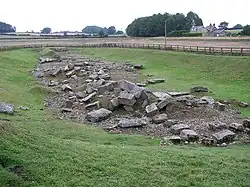Piercebridge Roman Bridge
Piercebridge Roman Bridge is the ruin of a Roman bridge over the River Tees, northern England. It is near the villages of Cliffe (North Yorkshire) and Piercebridge, County Durham.
| Piercebridge Roman Bridge | |
|---|---|
 Piercebridge Roman Bridge | |
| Location | Cliffe, North Yorkshire, England |
| Coordinates | 54.536°N 1.671°W |
| OS grid reference | NZ213156 |
.svg.png.webp) Location in North Yorkshire | |
The most recent excavations were by Channel 4's Time Team in 2009.[1]
History
The bridge carried Dere Street Roman road across the river.[2]
Piercebridge Roman Fort guarded the bridge.[3]
The first bridge was built around 90 AD, but this may have been replaced by a second bridge after it was washed away. The Tees has narrowed and changed its course over the centuries and as a result the remains lie in a field around 90 metres (300 ft) south of the current course of the river, and about 450 metres (1,480 ft) east of Piercebridge.[4][5]
Remains
What remains of the bridge are massive masonry blocks that formed at least five piers.[6] The lower courses of one of the abutments still stand, partially complete, and it is possible to see the holes into which the wooden structure of the bridge would have fitted.[7] All of the timber has disappeared in the nearly 16 centuries since the end of the Roman occupation.[8] The remains were discovered in 1972 during gravel quarrying.[4] The stone blocks are up to 1.5 metres (4 ft 11 in) long and the total bridge structure was 123 metres (404 ft) long.[9][10] Artifacts from the excavation of the bridge and fort are held in the Bowes Museum.[2][11]
Alternative interpretation
Whilst the majority opinion among archaeologists is that the structure is a bridge, an alternative interpretation has been proposed by archaeologist Raymond Selkirk, who contends that the structure is a navigation dam with an overspill channel. From this, and other evidence he argues that the Romans made far greater use of river transport than is generally recognised. His views are set out in his books The Piercebridge Formula (1983), On the Trail of the Legions (1995) and Chester-le-Street & Its Place in History (2000).[12][13]
See also
References
- Report of excavations https://www.wessexarch.co.uk/our-work/piercebridge-county-durham
- "Piercebridge Roman Fort". Head of Steam. Archived from the original on 16 July 2019. Retrieved 18 March 2020.
- "Piercebridge Roman Bridge, Piercebridge, North Yorkshire". Historic England. Retrieved 18 March 2020.
- "Piercebridge Roman Bridge". Enjoy Darlington. Retrieved 18 March 2020.
- "Piercebridge Roman Bridge". Virtual Globetrotting. Archived from the original on 31 December 2015. Retrieved 18 March 2020.
- "Piercebridge Roman Bridge, Piercebridge, North Yorkshire". Historic England. Retrieved 18 March 2020.
- Historic England. "Pierecebridge Roman Bridge (23766)". Research records (formerly PastScape). Retrieved 18 March 2020.
- "Piercebridge Roman Fort". Yorkshire Guide. Archived from the original on 4 July 2019. Retrieved 18 March 2020.
- "Description of Piercebridge Roman Bridge". English Heritage. Retrieved 18 March 2020.
- "History of Pierecebridge Roman Bridge". English Heritage. Retrieved 18 March 2020.
- "Piercebridge Roman Fort". This is Darlington. Archived from the original on 28 August 2016. Retrieved 18 March 2020.
- Selkirk, Raymond (2000). Chester-le-Street & Its Place in History. Birtley, County Durham: Casdec Print & Design Centre. pp. 93–122. ISBN 1-900456-05-2.
- "Piercebridge Roman Fort, Vicus and Riverworkings". Brigantes Nation. Archived from the original on 25 January 2003. Retrieved 18 March 2020.
